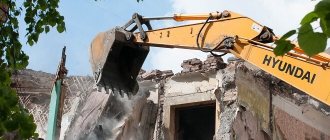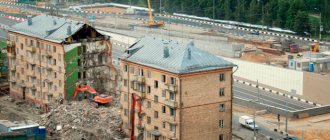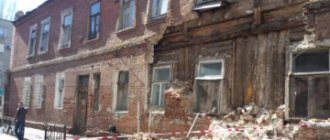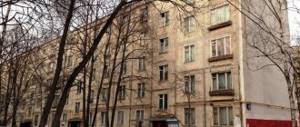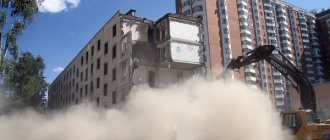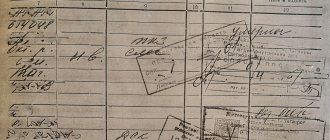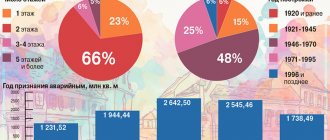Almost six months ago, on August 12, 2021, the Moscow city government approved an order regulating the procedure for the demolition and relocation of residents of apartment buildings. In essence, the order also approved the stages of resettlement with deadlines, however, the deadlines may change depending on the implementation of the renovation program.
Renovation in Moscow in 2021
As we have already said, the renovation program will be completed in the first stage at the end of 2021. You can find out when the demolition of a particular building will begin by studying the lists on the official website or by checking the information at the city hall office.
According to official sources, the lists of houses currently announced on websites are not final. The process of coordinating the actions of the government and developers is ongoing, and therefore changes are promptly made to the construction and resettlement priority plan.
The decision on when a particular house will be demolished is made jointly by the authorities and citizens:
- First, a decision of the general meeting of the house is required;
- then - consultation with the elders of the houses;
- the expert opinion of technical specialists is taken into account, determining wear and the degree of risk of further operation of five-story residential buildings subject to renovation.
After all stages have been completed, you should clarify when work begins at the launch site and how the relocation schedule is calculated.
The procedure for replacing residential premises with a new one is designed for the period of construction of a new house, but does not directly depend on this. You can check whether it is possible to move residents into a comfortable, newly constructed building using the official website or by personally contacting the mayor’s office. Construction organizations that directly carry out construction orders also have detailed information.
A specific house is included in the list of buildings to be demolished when the documentation is ready and there is a fully agreed-upon move of the other residents of the house. Information about planned relocation can be found on official websites or read in a personal notice sent by mail.
If the person moving has found a more profitable option and plans to move with an additional payment, it is necessary to submit to the Moscow State Property Department, in addition to the mandatory list of documents, documents on payment for new housing.
What is renovation
Renovation is the replacement of old houses with new ones. Demolition is happening in parallel with construction. People arrive in new homes immediately after moving out. There is no need to wait. This reduces the possibility of manipulation and various dishonest actions on the part of developers.
The implementation period for a large-scale renovation project in Moscow is set until 2032. This is the last time period. By this time, it is planned to re-approve the project and possibly use the experience of reconstruction in other large populated areas of Russia.
The main goal of the project is to change not just one house or neighborhood, but the entire city, turning it into a comfortable living environment.
Houses included in renovation
Why will old houses be demolished in the near future? There are those who say that old buildings can serve for many more years. But it is necessary to take into account not only the wear and tear of concrete, brick, stone, but also obsolescence and the exponentially growing costs of repairing communications.
The longer the service life, the more the costs of repairs and maintaining the house in good condition will begin to increase. At the same time, the comfort of living will remain approximately at the same level. The so-called “enclosing structures” - walls, ceilings, foundations - will remain the same, built in the last century.
That is why the fate of the houses for renovation has been decided in advance - they will have to be demolished in the near future in order to build more durable structures that meet modern comfort requirements. Further exploitation of “Khrushchev” and similar houses will only bring costs disproportionate to the investment.
House demolition schedule
Buildings that are included in Moscow renovation projects will be demolished only after the complete relocation of all residents of the old apartment building. That is, all residents of the old “Khrushchev” must find suitable housing, receive compensation for it, or pay extra for more comfortable housing in another building. Only after all issues related to relocation have been resolved, dismantling of the old house begins.
Renovation and the demolition schedule for old houses depends on many factors: the consent of residents, the availability of a launch site, the readiness of documentation, etc. You can familiarize yourself with the approved list today on the website of the Complex of Urban Development Policy and Capital Construction, as well as by looking at the list of launch sites.
If all organizational issues are settled, the level of wear and tear is also taken into account. If the technical condition of a building indicates possible destruction or irrational operation, it will be a priority on the list of houses for demolition.
Also in the first positions on the list will be houses that are part of a complex development and the demolition of which is required to organize transport interchanges and improve other communications.
The first list already includes houses that are planned for demolition in order to develop the infrastructure of the area, as well as those in which residents gave 100% consent to move.
The Moscow Government is not happy with clear dates for the implementation of the first stage of renovation, but there is a figure - the end of 2021, i.e. We will see the first results already this year. By this time, work on most of the first launch sites will be completed, and the modernization of the public space of the neighborhoods will be implemented at the first stage.
The speed of implementation of renovation projects depends on the placement of old communications at the starting sites. If they need to be moved to provide water, electricity or heat to a large part of the area, the time frame for commissioning new structures will be increased.
Map of demolished five-story buildings and launch sites
How does the resettlement process work?
- Before moving, residents of the house being demolished are given a notice about the timing and address of the move via mailbox or in person.
- Upon receipt of notice, all adult owners are required to inspect the proposed property. By law, there must be at least three options to choose from.
- If you liked the apartment you inspected, you must enter into an agreement - consent to relocation.
- The Moscow City Property Department will prepare an exchange agreement and agree on a signing date convenient for both parties.
- Next, you need to register ownership. Even if until this moment the citizen lived under a social tenancy agreement, he will receive a new apartment. This can be done at the nearest MFC.
- At the information center, present documents certifying the right to own the property and receive the keys.
Houses that have already been demolished
There are already first results from the implementation of the program. As for the renovation, the demolition sequence is already close to completion at the initial stage. New residential buildings have been built on the site of demolished houses, vacant lots, irrationally located parking lots and other underused land plots.
Only houses with high architectural and cultural value, which will be preserved for future generations of Muscovites, have not been demolished. And as a general rule, the construction of residential premises in them is not provided. These are either commercial buildings or completely reconstructed buildings for administrative needs.
Demolished houses are land plots free for development and included in a comprehensive architectural and planning solution. This takes into account the construction or modernization of main communications with the expansion of recreational areas.
The legislative framework
Renovation promoted under the Federal Program is a process in which old houses are demolished and their residents are subsequently resettled in new housing.
In Moscow, the resettlement process is regulated by the following Resolutions:
- Federal Law No. 141-FZ on amendments to the 1993 law “On the status of the capital of the Russian Federation” came into force in July 2021. It establishes the procedure for creating a project, compiling a list of houses covered by the program, and regulates other renovation issues.
- On the establishment of a residential renovation fund (8.08.17 No. 517-PP).
By Resolution No. 174-PP dated March 11, 2019 “On Amendments to Resolution No. 517-PP,” an amendment was made to the previously adopted decision regarding resettlement areas. It allows the city renovation fund to offer apartments in other areas of the capital.
According to the amendment, citizens have the right to accept or reject this proposal.
Many Muscovites began to interpret the amendments to Resolution No. 517-PP in their own way. Allegedly, the city authorities were given the opportunity to relocate residents from prestigious areas “to settlements.” Experts are confident that the authorities have no rights to impose housing in other areas.
Nuances of obtaining individual documents
Registration of certain documents for moving traditionally raises many questions. Below we will look at some of the nuances.
Extract from the Unified State Register for an apartment
Sample extract from the Unified State Register
Today, it is the extract from the Unified State Register that is considered the main document confirming ownership of real estate. Unlike the Certificate, the extract contains all relevant information not only about copyright holders, but also about encumbrances and the main characteristics of the object. You can receive an extract electronically via the Internet or in paper form at the public services department. The legal force of these options is identical.
On the Rosreestr website there is a special form for obtaining information from the Unified State Register of Real Estate, thanks to which you can quickly receive an extract to your email. To complete the request, you will need the exact address or cadastral number of the apartment, as well as the applicant’s passport details.
The production time for the statement is from 3 working days, the cost is from 300 rubles. Online payment for services is available.
Permission from guardianship authorities
If one of the owners or tenants of the property is under 18 years of age, then their share in the apartment can be disposed of only with the consent of the guardianship authorities. This also applies to renovation relocations.
Permits are issued by social protection departments at the child’s place of residence within 15 working days from the date of submission of the application. To obtain a permit you will need:
- application - it is better to fill out and sign directly at social security;
- copies of passports of all apartment owners;
- passport or birth certificate of the child, parents’ passports;
- copies of documents for the apartment;
- personal account;
- consent to the transaction from the child.
In connection with the renovation, other documents may be needed. We recommend that you clarify the list of required certificates at an appointment with a specialist.
There is no state duty for issuing a permit.
Notarial consent of the spouse
If an apartment was purchased during marriage and the spouses did not enter into a marriage contract, then it is automatically considered the joint property of husband and wife. It does not matter which spouse is indicated as the owner in the certificate or extract. A couple should only manage such an apartment jointly.
Therefore, to transfer an apartment for renovation, you will need the notarized consent of the spouse who is not indicated in the certificate, by analogy with a sale or gift. You can obtain consent from any notary on the day of application. Documents needed:
- passports of spouses;
- an extract from the Unified State Register for the apartment or a certificate of ownership;
- Marriage certificate.
The notary will independently draw up the text of the consent and print it out on a special form. The cost of registration varies greatly among different notaries, and can range from 1000 rubles and more.
Is it possible to increase (purchase) the area of housing?
If desired, the renovation participant can purchase additional square meters. There are no special restrictions on the additional area purchased, but according to the program it is established that no more than 100 square meters can be purchased additionally. m.
Additional meters will have to be paid. You can calculate the amount you will have to pay for additional meters using the formula:
D = (P1 – P2) x C – 10%, where:
- D is an additional payment, rub.;
- P1 – total area of new housing, taking into account additional purchased meters, sq. m. m;
- P2 – average area of housing received under the program, sq. m. m;
- C – cost of 1 sq. m, rub.;
- 10% – the Moscow government promises a discount to all program participants.
Price 1 sq. m is determined by dividing the cost of the apartment by the area.
Let a one-room apartment cost 6 million rubles, and its area is 40 square meters. m. Therefore, 1 sq. m costs 6,000,000/40 = 150 thousand rubles. If a program participant moves to a house where the apartment area is 50 square meters. m, and he needs an apartment of 70 square meters. m., you will have to pay an additional 3 million rubles. (20 x 150,000).
You can pay extra for additional meters not only with your own funds. For payment you are allowed to use:
- mortgage;
- maternal capital;
- housing loan certificate;
- housing subsidy.
If by the time of check-in the program participant does not have the funds to purchase additional meters, he has the right to exercise his right to increase the area over the next 2 years.
In the allotted time, the owner of a new apartment can find a suitable option. Then he submits an application to purchase residential space with a 10% discount.
Possible compensation for program participants
Muscovites who fell under the “skating rink” of renovation against their own will can receive monetary compensation for their old apartments. To obtain it, you must submit an application for compensation to the city authorities. This can be done within 30 days after delivery of the draft “Swap Agreement”.
There are cases in which owners of old homes can also demand compensation if they consider the exchange to be unfair:
- are not satisfied with the proposed conditions (quality of house and apartment, area, etc.);
- In old housing, a lot of money was spent on repairs;
- The renovation program included non-residential premises (shop, hairdresser, etc.).
Every citizen can sue if he believes that any of his rights have been violated. However, taking into account the information available to lawyers, as well as the answers received from city authorities, we can conclude that it will be extremely difficult to win the case.
The mayor's office warned the renovation participants on its official website:
- If you receive an equivalent apartment, there will be no compensation for repairs, since all housing is provided with comfort-class finishing.
- If a program participant decides to receive compensation, the cost of his repairs (finishing) will be taken into account during the assessment of his apartment.
Even if compensation can be achieved, its amount will be meager. For the amount received, it will not be possible to buy a better home than the one the person refused.
House demolition schedule - addresses of buildings by Moscow districts
- Basmanny district
- Bakuninskaya st., vl. 60
- Poslannikov lane, ow. 18-Starokirochny lane, ow. 5
- Krasnoselsky quarter 998, 2/1, building 1,2
- Rusakovskaya st., 6
- Tagansky st. Melnikova, 2
- SAO
- Beskudnikovsky district, apt. 8, 9, building 1, 2
- Voykovsky district, Narvskaya st., ow. 5
- Golovinsky district, Avangardnaya st., ow. 10, Flotskaya st., vl. 68, buildings 1 and 2, Onezhskaya st., ow. 35, building 5, 6 and 7, Kronstadt Boulevard, ow. 55, Smolnaya st., ow. 21
- Western Degunino district, Angarskaya st., no. 33, Bazovskaya st., no. 15, st. Taldomskaya, vl.1
- District Koptevo, 3rd Novomikhailovsky Ave., ow. 8, building 1
- Timiryazevsky district, Astradamskaya st., vl. 9A, Dmitrovskoe highway, ow. 55
- NEAD
- Alekseevsky district, st. Staroalekseevskaya, ow. 3
- Butyrsky district, microdistrict. 78, room 66, st. Rustaveli, vl. 3, room 4
- Losinoostrovsky district, st. Izumrudnaya, ow. 26A, microdistrict 3, room 53, st. Taininskaya, ow. 13
- District Marfino, Gostinichny pr., vl.8, bldg. 2
- District Maryina Roshcha, st. Oktyabrskaya, vl. 1058, Sheremetyevskaya st., vl. 5, k.1, 13, k.1
- Rostokino district, st. Agricultural, building 14
- Sviblovo district, Nansen passage, ow. 8
- District Yuzhnoye Medvedkovo, st. Molodtsova, 33, building 1
- District Yuzhnoye Medvedkovo, Dezhneva proezd, 12, building 1
- VAO
- Bogorodskoye Millionnaya st., vl. 3
- Bogorodskoye district, microdistrict. 8B, room 4
- District Vostochnoye Izmailovo, 13th Parkovaya St., ow. 16, 15th Parkovaya st., ow. 27, 16th Parkovaya st., ow. 12
- Golyanovo Shchelkovskoe highway, 71, building 1 and 73
- Ivanovskoe district, microdistrict. 40-52, rooms 2 and 5
- Izmailovsky Ave., ow. 5
- Kosino-Ukhtomsky district, st. Black Lake, ow. 2-8, Orenburgskaya st., no. 3, Kaskadnaya st., ow. 21, plot 1 and 2
- Metrogorodok district, Otkrytoe highway, ow. 30, 26
- Perovo district, Plekhanova st., ow. 18, 22, 2nd Vladimirskaya st., ow. 30, Zeleny prospect, ow. 27-29
- Northern Izmailovo district, microdistrict. 80, bldg. 7 and 9, Konstantin Fedina st., ow. 13-19
- SEAD
- District Vykhino-Zhulebino, microdistrict. 129, Fergana st., no.5
- Kuzminki district, apt. 115, room 1710, building 18; sq. 116, buildings 1 and 2 (Shumilova St., 4); microdistrict 113, st. Young Lenintsev, ow. 42; microdistrict 119, Volgogradsky pr-t, ow. 163; microdistrict 120, st. Zhigulevskaya, vl. 3; microdistrict 120, st. Zelenodolskaya, vl. 28, room 4; microdistrict 118, st. Young Lenintsev, ow. 117, 99; microdistrict 117, st. Young Lenintsev, ow. 73
- Lefortovo district, Shepelyuginskaya st., building 16, apt. 3, room 6
- Lyublino district, microdistrict. A, Lyublinskaya st., 113; microdistrict Zh, Krasnodonskaya st., 46; microdistrict A, Lyublinskaya st., 109, building 1; microdistrict A, Lyublinskaya st., ow. 111, room 211; microdistrict Zh, st. Upper fields, 19, building 2
- Nizhny Novgorod district, apt. 80,
- Ryazan district, microdistrict. 128A, st. Papernika, 12
- District Tekstilshchiki, st. Chistova, ow. 3A, page 1
- Yuzhnoportovy district, microdistrict. D, st. Petra Romanova, 18
- Southern Administrative District
- Biryulyovo East district, microdistrict. Zagorye, opposite ow. 2
- District Biryulyovo Western, Bulatnikovsky Ave., 16A; Kharkovsky Ave., near vl. 1
- Danilovsky district, at the intersection of 5th Roshchinsky Ave. and 2nd Roshchinskaya Street; Projected passage 4062, no. 8
- Donskoy district, Sevastopolsky prospect, opposite No. 7,
- Nagatinsky Zaton district, st. Rechnikov, 18-20
- Nagatino-Sadovniki district, Varshavskoe highway, opposite 47, bldg. 2, opposite 61A
- Nagorny district, Simferopol Ave., ow. 712
- Tsaritsyno district, Yerevan st., opposite 10, building 1; Kavkazsky Boulevard, vl. 40-42; Kantemirovskaya St., opposite No. 27; st. Kantemirovskaya, ow. 37-41; Kaspiyskaya st., 28, building 4; Sevanskaya st., vl. 54-56; st. Bekhtereva, vl. 3, z/u1 (Tsaritsyno district, microdistrict 4, room 402)
- Chertanovo-Yuzhnoye district, microdistrict 26, room 81-82
- South-Western Administrative District
- Academic district, apt. 18, st. Shvernika, ow. 6
- District Zyuzino, apt. 35, B. Yushunskaya st., ow. 7A; apt. 14, Bolotnikovskaya st., ow. 31; sq. 36, Bolotnikovskaya st., vl. 48; sq. 37, Bolotnikovskaya st., vl. 43; sq. 14, room 3; , sq. 40, Kakhovka st., ow. 2313; sq. 37, Kerchenskaya st., ow. 2; sq. 40, Kerchenskaya st., ow. 20; sq. 42, Kerchenskaya st., ow. 30, 26; sq. 38, Sevastopolsky Ave., ow. 71, ow. 79; sq. 26, 31, Chernomorsky Boulevard, 22/2
- Konkovo district, microdistrict. 6, rooms 2 and 3
- Lomonosovsky district, st. Architect Vlasov, building 2
- Obruchevsky district, intersection of st. Garibaldi and st. Architect Vlasov
- Severnoe Butovo district, Feodosiyskaya st., vl. 7
- Cheryomushki district, apt. 20, 21, Garibaldi st., no. 17
- District New Cheryomushki, apt. 32A, uch. 12
- Cheryomushki district, apt. 20, 21, Profsoyuznaya st., ow. 32
- District Yuzhnoye Butovo, Krasnolimanskaya st., vl. 27
- Company
- Kuntsevo district, Molodogvardeyskaya st., 44
- Kuntsevo district, Bobruiskaya st., 15
- Mozhaisky district, apt. 71, 72, st. Kubinka, 18, building 2
- District Ochakovo-Matveevskoe, apt. 5, B. Ochakovskaya st.; microdistrict 1, Veernaya st.
- Solntsevo district, Shchorsa st., no. 15, st. Aviatorov, st. Rodnikovaya
- Filevsky Park district, Beregovoy proezd, ow. 2, ow. 2, p. 18, vl.2, p.19
- Fili-Davydkovo district, st. Kastanaevskaya, vl. 44-48, bldg. 1 and 2
- SZAO
- Mitino district, Novobratsevo district, Parkovaya st., ow. 31 (opposite)
- Northern Tushino district, apt. 5, Turistskaya st., vl. 14, k.1, 2; st. Vilisa Latsisa, ow. 42;
- District Khoroshevo-Mnevniki, apt. 83, Generala Glagolev st., ow. 5, room 1; st. Demyan Bedny, ow. 2215; Karamyshevskaya embankment, building 22, building 2; st. Mnevniki, ow. 10, building 1
- Shchukino district, microdistrict. 12, Novoshukinskaya st., ow. 8
- Zelenograd
- Kryukovo Zelenograd, Kryukovo district, microdistrict. No. 19, room 1935, room 1934
- Old Kryukovo Zelenograd, microdistrict No. 9, bldg. 934 – 936
- TiNAO
- Mikhailovo-Yartsevskoe village, village. Shishkin forest, near houses 9 and 21
- Ryazanovskoye village, village Banner of October, near 3
PLANS FOR HOUSE DEMOLITION FOR 2021-2022
